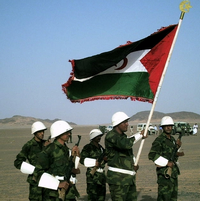This week in the small Western Saharan town of Tifariti, delegations are arriving for the 13th Conference of the Polisario Front, the United Nations-recognized group that has fought since the 1970s for Western Sahara's independence from Morocco. The gathering, to be held Dec. 15-20, is expected to draw some 1,500 people from the region, as well as from Asia, Europe and Latin America. It will broach a topic that has otherwise gone largely overlooked in the aftermath of the Arab Spring uprisings that have swept the Middle East and North Africa in the name of greater representation and government accountability: Western Sahara's sovereignty and autonomous status.
In October 2010 -- two months before 26-year-old street vendor Mohamed Bouazizi set himself aflame in Tunisia -- as many as 15,000 Sahrawis, indigenous to the Western Sahara, set up the Gdeim Izik camp outside Laayoune, one of the largest cities in the disputed territory south of the Moroccan border. The Sahrawis were protesting poor living conditions, poverty and human rights abuses at the hand of the Moroccan government, which annexed Western Sahara in 1975 after Spain relinquished administrative control of its former colony.
The peaceful demonstration, which turned deadly when Moroccan forces raided and dismantled the camp a month later, was described as the largest protest against Moroccan rule in the history of the Western Sahara dispute.

